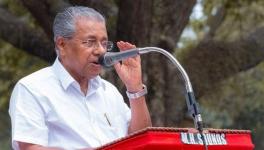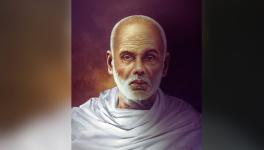The Kerala Story: A Poorly Defined Plot Caught up in Controversies
File Image
'The Kerala Story', a movie caught between sensationalism and poor direction, fails to deliver the right message and adds to the hate at the same time.
Right outside the theatre at Laxmi Nagar's V3S Mall, four policemen were stationed outside the gate on a Friday evening, three of them inside the theatre. The guy at the security check, when he saw the reporter staring at the policemen, said, "It is a Hindu Muslim film; that is why they are here in case there are any problems."
People waited in anticipation for the film to begin inside, and there were certain expectations that they had come with.
Girish, a Company Secretariat, talking about what he expected from the film, said, "I do not think this film is anything communal; all it has is the reality of India and how ISIS functions. Every community should watch the film."
As much as he said that, the people did seem to be charged up inside the theatre during the film, as they passed constant Islamophobic comments and statements.
The movie, ever since the release of its teaser and trailer, has been caught up in controversies. The film's initial teaser claimed that the film was about the 32,000 women who were forcefully converted and radicalised by Islamic fundamentalists.
After being caught up in factual inaccuracies, the director had to get the trailer description changed from the story of 32,000 women to three women. However, towards the end of the film, one of the characters can still be seen claiming that there are over 30,000 women who have been brainwashed, converted, and taken to Syria. Only after the film ends, a note comes on the screen saying, "The makers have used their own methods to devise the data claimed. It is now that they have filed an RTI seeking a response from the government on the data."
The film, before its release, received a backlash from several other people. The Chief Minister of Kerala himself, Pinarayi Vijayan, opposed the release of the film and slammed the film too. He called it a propaganda movie aimed at communal polarisation. He said that the film had been made to gain an advantage in the electoral politics of Kerala by Sangh Parivaar.
Further, just a day before the film's release, taking a jab at the makers, the CM tweeted, "Kerala is making great strides in ending homelessness under the LDF Govt's #LIFEMission. Today, they handed over 20,073 new homes and entered into an agreement with 41,439 more families. So far, 3,42,156 families have benefited. This is the real Kerala Story!"
However, the CM was not the only one to tweet about it or take a stand against the film. MP Shashi Tharoor and others had expressed concerns about the film and its filmmakers, director Sudipto Sen and 'creative director' and producer Vipul Amrutlal Shah. Tharoor responded to the development on Twitter, writing, "The plot thickens." The filmmakers have modified the description of the clip on YouTube from '32,000 ladies' to 'three women'... "I submit my case."
Post the controversies regarding the film, it was still screened at the Jawaharlal Nehru University (JNU) in the presence of the director, producer, and one of the lead actors of the film, Adah Sharma.
The screening was organised by the ABVP (Akhil Bhartiya Vidyarthi Parishad). Right after the film was screened, the students from the other student wings, such as the SFI (Students Federation of India), protested outside the Sabarmati Hostel.
"The Kerala Story' is another attempt of Sangh Parivar's 'lie factory' to polarise society by propagating Islamophobia and outright lies, such as the figure of '32,000' women, who the film claims have joined the terror outfit ISIS through 'love jihad' in Kerala," said Sagnik, SFI Secretary, JNU to the Indian Express.
Explaining the conclusion of the figures shown about the movie, the director of the movie, Sudipto Sen, said, "The figure 32,000 is arbitrary, but also based on some facts."
Explaining how they zeroed in on the number, Sen said that they added data from 2014 with that of 2016 and matched numbers given by Oommen Chandy (former state chief minister), where he mentioned that around 2,800-3,200 conversions were taking place per year, adding that they had filed an RTI but did not get any data from the government."
A reporter who was present at the screening also shared how they were given labels and targeted because they asked the director some important questions. When this reporter questioned the numbers the director had achieved and the legitimacy of the same, they were bashed by the members of the ABVP, who started shouting that "this reporter is a member of the left" and that they had been planted to ask such questions.
Contrary to the treatment given to the BBC Documentary about the happenings in India during the Narendra Modi regime and the inside story of the Gujarat riots in 2002, this film 'The Kerala Story' was allowed a successful screening by the University authorities.
When the BBC documentary was screened a few months back, the electricity was cut, and stones were thrown at the students who were a part of the screening. On the other hand, the screening of this film was peacefully carried out in the presence of University authorities. In certain colleges, the students were even detained, and charges were pressed against them for being a part of the screening or organising one.
The Plot
One thing that was the crux of the whole movie was the use of sensationalism and the use of typical Arabic music to show Muslims that seemed unnecessary at several points. The movie does not just take a jab at ISIS, but also evidently, since the movie is from Kerala, takes a jab at communism.
At one point in the Kerala Story, Geetanjali, the daughter raised by a communist father, seemed to complain to him about not teaching her enough about the Indian culture & values while she was growing up. She then adds on how communism is a foreign concept and borrowed from the West.
After hearing this from her daughter, the father is shown with a sad duck face. Initially, in the same movie, the Muslim girl, Asifa, who tried to lure all the other three women, is also seen bashing communism. The film uses posters of Marx and Stalin to warn the audience that communism is a Western Ideology and that Indians should be warned repeatedly.
In one of the first scenes, where Geetanjali is trying to talk about religion and says that her father did not believe in any and was an atheist, she is made fun of by the Muslim character who says that it is not like her father did not believe in religion, it was just that he was influenced by communism, and that this is how communists were. Further, the character says that if people were to continue following the same path, they would rot in hell.
As much as the film has talked about Hindus & Christians getting trapped, converted & sent to Syria, it doesn't have deep knowledge about the reason behind such conversion and what feeds it.
For example, in the switch where the girls started to wear a hijab, there was just one scene, and the next day, the two girls started to wear one. The girls were even teased at a market, post which Asifa tells them that the sole reason why they were teased was because they never wore a hijab. She says that no girl who wears a hijab is ever teased.
The film tries to subtly pose its position on Iranian women burning hijab, which, not to forget, is a burning issue in India as of now. In the last part of the film, Sharma, aka Shalini, is seen to be looking at the burning hijab, which might come as a triggering point to those who wish and are fighting to wear it in India. As a viewer with complete knowledge about what the hijab Row is all about, the reporter feels that there should have been a trigger warning ahead of that scene.
As per the reporter's knowledge, the scene will add to the existing hatred of the hijab issue amongst the majority community. The director just uses a kid who snatches the hijab from the hands of the protagonist Shalini and burns it down while the others sing and watch.
In one of the last scenes, the American official asks Shalini her name, and she responds, "Shalini Unnikrishnan, A Hindu from Kerala, India," expressing extra stress on 'Hindu'.
Post the film, as the people walked out of the theatre, some were seen cracking jokes about a few things, while others were wholly disturbed and quietly moved out. Others had different opinions on it and said that this was reality. In a conversation with NewsClick, an old uncle said," Every girl who is 15 should watch this movie. Not even 18, I would say 15 because it is too late by the time the girl turns 18."
Get the latest reports & analysis with people's perspective on Protests, movements & deep analytical videos, discussions of the current affairs in your Telegram app. Subscribe to NewsClick's Telegram channel & get Real-Time updates on stories, as they get published on our website.
























